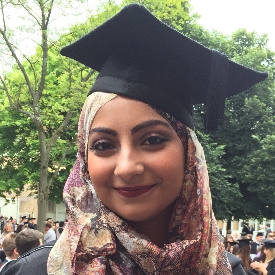
Erum Dahar
Country Of Origin: United Kingdom
Degree: MSc Politics, Philosophy & Management, 2017
Why did you choose to study at LUMS?
LUMS maintains an excellent position in many league tables around the world, so the opportunity to study at an institution as prestigious and well-known was appealing. I was also aware that the school’s high ranking is backed by high praise from former and current students at LUMS, who informed me of the wide variety of extracurricular and CV-building opportunities LUMS has to offer, in addition to its high standard of teaching.
What did you like most about your degree?
I really enjoyed the PPM degree because it gave me a greater insight into the political and economic forces that shape our world. Often, politics and managerial studies are taught as separate degrees, so I found this course to be a unique opportunity to learn about the intersection of these fundamental subjects. I also found the PPM course a lot more engaging and interesting compared to my previous degree because it focused on critically analysing a range of subjects – from modules on ‘Theorising Security and War’ to ‘The Rise and Growth of Human Resource Management’. It also equipped me with a range of important skills that will be useful when applying for jobs. For example, I studied a compulsory module on ‘Research in Organisational Settings’, which helped me improve my research and writing skills. The course convenor and administrative staff were also incredible supportive throughout the year, and were willing to listen and help with any issues that I was dealing with. They also organised trips for us during fresher’s week and provided us with funding for more event, which made it a lot easier to make friends on the PPM degree as well as students from other LUMS degrees.
What was your involvement in university life?
Whilst studying, I also took part in a number of extracurricular activities. My most favourable experience was interning for the Remembering Resistance project at Lancaster University, which is an initiative that involves researching and cataloguing the history of protest in Manchester. I believe that this internship was more rich and exciting than my previous internships at the UN and other well-known international NGOs, as I was able to make a real impact through my work and gain a plethora of new skills. I particularly enjoyed visiting the archives at Manchester Central Library, being interviewed on a local radio programme, and building an exhibition to showcase the research that my fellow an intern and I had produced. I also interned for the Richardson Institute – a peace institute at Lancaster University – which involved writing and editing a report on counterterrorism for a London-based NGO. It just goes to show that you do not have to look far to gain valuable work experience if you study at Lancaster University.
How would you summarise your experience at Lancaster?
I feel that I have grown and matured a lot both as a student and as a person, throughout my undergraduate and postgraduate studies at Lancaster. Whilst I was striving to thrive and succeed in a competitive environment during my undergraduate studies in law, I was exploring political and economic subjects that helped me to understand the ever-changing world we are living in during my Masters degree. Although these two degrees are based in different departments and offer vastly contrasting learning environments, I ultimately gained important skills that enable me to think critically about the world and current affairs. The skills I have gained are supplemented by legal, political and economic knowledge that I’m sure will be useful to potential employers, and which remain relevant and useful after completing my studies. On a more personal level, Lancaster has become my home away from home, and I have made friends who are like family.
How the skills you gained during your time at Lancaster will help you in the future?
I believe that this degree has made me a more employable graduate, as research shows that organisations and businesses are interested in employing people who have a critical eye and can analyse issues holistically. I’m so happy I decided to do my Masters in PPM – it’s been the best year of education I’ve had so far and I’d definitely recommend it to others!

